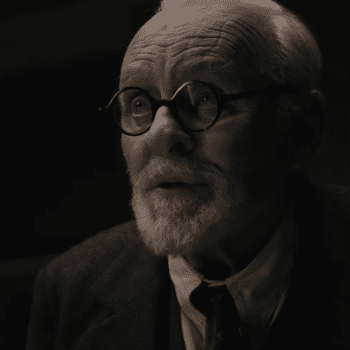The 1959 version of Ben-Hur is a triumph of filmmaking—one that won 11 Oscars, boasts Charlton Heston at his prime and features one of the most iconic action sequences in cinematic history.
The 2016 version of Ben-Hur is … serviceable. The chariot scene is a dynamic blend of live-action and CGI. A sea-based battle, captured almost completely inside the dark, dungeon-like recesses of a Roman warship, feels gritty and powerful. And the movie was clearly made with a faith-based audience in mind: Jesus moves from the mysterious, largely unseen catalyst from the 1959 version to a fully realized presence (played by Rodrigo Santoro) here. The spiritual underpinnings of the story are correspondingly more in your face.
But in underlining the story’s spirituality, the new Ben-Hur loses some of its spiritual power. And really, I think it all comes down to Messala.
The story of Ben-Hur always comes down to the relationship between frienemies Judah Ben-Hur, Jewish prince, and Messala Severus, Roman soldier. The two were childhood friends (“brothers” in the new movie) who care deeply for each other. Or, at least, they did until Severus becomes a bigwig in the Roman army, returns to Jerusalem and tries to enlist Judah’s help in quelling the city’s pesky Judean Zealots. Their relationship begins to sour from that point on, cracking altogether along with a broken ceiling tile (or, in the new movie, the slinging of an arrow). Messala sends Judah to the slave galleys and Judah’s mother and sister into prison, causing—as you might imagine—hurt feelings.
It’s interesting to see the Roman’s rehabilitation throughout the story’s many movie incarnations. In 1926’s Ben-Hur: A Tale of the Christ, Messala (played by Francis X. Bushman) is an ambitious, ruthless Roman who long ago abandoned whatever affection he ever had for Judah.

In 1959, Messala (Stephen Boyd) is given a few more layers to his character. He still likes his old childhood chum. But he is, at the end of the day, an ambitious cog in the Roman Empire. Judah is a Jew. Messala knows which side of his Roman Meal bread is buttered on, and when he has to make a decision against his old pal, he doesn’t hesitate. And even as you see remnants of his old affection linger, the story’s circumstances eventually turn Boyd’s Messala into, I think, one of moviedom’s most pitiable, terrible villains.
In the 2016 version of Ben-Hur, Messala (Toby Kebbell) is not the two-dimensional scheming evildoer we see in 1926 or the dastardly back-stabber we see in 1959. He’s a military middle-manager, trying to do his job the best that he can—even if that means betraying his adoptive mother, the girl he loves and his bestest friend in the whole wide world. He’s a good guy who’s pushed into being bad. Even when Messala sends Judah to the galleys, we understand Messala’s motivation. We may even sympathize with him a bit.
At first, I kinda liked this new recast of Messala. I like complex villains and antiheroes.
But in a sense, Messala’s rehabilitation strips the new Ben-Hur of something critical to the story’s power and poignancy: Its sense of loss.
Caution: Spoilers for both movies lie ahead.
Let’s go back to that 1959 chariot scene and its immediate aftermath. Judah wins the race and stands ready to forgive Messala, who’s broken and dying. And then this happens:
With his dying breath, Messala tells Judah that his mother and sister aren’t dead, but worse: lepers. Judah then staggers out to accept the accolades of the masses. He’s crowned with laurels and is proclaimed a “god.” But this god is not just false, but empty. He’s been so consumed with hate and revenge that, even when he’s received everything he’s dreamed of for years, his victory is hollow. His triumph feels like defeat.
It’s a powerful contrast to what we later see from a mostly unseen Jesus: Instead of laurels, He’s given a crown of thorns. Instead of held up for adulation, Jesus suffers Jerusalem’s scorn and hatred. But instead of a victory that feels like a loss, Jesus’ “defeat” and death is a victory—a victory in which the whole world wins.
The new Ben-Hur dispenses with those powerful cinematic contrasts and instead gives us a predictable, Christian, paint-by-numbers ending.
In the 2016 flick, Judah goes to watch the crucifixion first. He hears Christ’s last words, including “Forgive them, Father, for they do not know what they do.” He falls to his knees and realizes that he’s allowed himself to be consumed by hate and revenge for far too long.
And so he goes to make amends with Messala—remarkably still alive. They forgive each other. They reconcile. And they eventually ride off, almost literally, into the sunset together.
It’s a nice message: Love is stronger than hate, it’s never too late to forgive, etc. But the movie, as a movie, is the worse for it. The artistry is gone, and in its place is a clunky, forced moral. It feels very much like a Christian movie, only with a bigger budget. But for this Christian, it’s not nearly as spiritually powerful as its predecessor.















